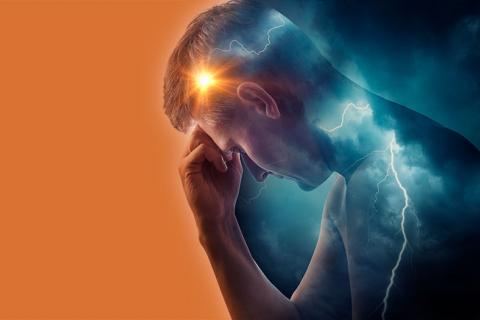
A new observational study shows that people with depression have a higher risk of having a stroke, both an ischemic stroke and a hemorrhagic stroke. In addition, it has also found that patients with symptoms of depression are more likely to have a worse recovery after an acute stroke.
The Interstroke study included data from 26,877 adults (40.4% women) with a mean age of 61.7 years residing in 32 countries in Europe, Asia, the Americas, and the Middle East. More than 13,000 experienced a stroke, and of these, 18% had symptoms of depression, compared with 14% of individuals who did not have a stroke. The results have just been published in the scientific journal Neurology.
The researchers, led by Robert Murphy, from the University of Galway, in Ireland, adjusted for stroke risk factors such as age or sex, educational level and habits such as physical exercise, and verified that people who manifested symptoms of depressed before the stroke had a 46% higher risk of suffering it compared with those who did not show depressive symptoms. They did not find, however, that treatment with antidepressants influenced the risk of stroke.
Higher mortality after suffering a stroke in people with depression
Depression did not influence the severity of the stroke, but it was observed that suffering from this mental disorder did mean that the patient had a worse recovery one month after the attack and higher mortality during that period (10% versus 8.1%). They also found that the severity of depression did influence the risk of stroke, since patients who reported five or more symptoms of depression had a 54%
higher risk of stroke than those without symptoms, while those who reported having three or four symptoms and those with one or two had a 58% and 35% increased risk, respectively.
“Doctors should be on the lookout for symptoms of depression and can use this information to help guide health initiatives focused on stroke prevention.”
“Depression affects people all over the world and can have a wide range of impacts on a person’s life,” says Murphy, who believes that “doctors should be on the lookout for these symptoms of depression and can use this information to help to guide health initiatives focused on the prevention of strokes”.
It is not the first time that a link between depression and stroke has been established, since previous research has found associations, such as a study led by neurologist Marialaura Simonetto, from the University of Miami, in Florida, and presented at the meeting of the Academy American Neurology Conference held in 2019, which included 1,104 people with an average age of 70 years and no history of stroke who were followed for 14 years.
At the beginning of the study, 198 of these people (18%) had symptoms of depression, and after adjusting for other factors that could influence the risk of stroke (arterial hypertension, smoking, diabetes…), the authors found that people with more symptoms of depression were 75% more likely to experience an ischemic stroke than people without symptoms of depression, and that each five-point increase in depression test score was associated with a 12% increased risk of ischemic stroke.
The report Depression and Neurology of the Spanish Society of Neurology (SEN), presented at its last meeting, also addresses this relationship and indicates that while 4-5% of the general population suffers from depression, in the case of people with neurological diseases it can reach 30-50%, according to José Miguel Láinez, president of the SEN.
The prevalence of depression in post-stroke patients is around eight times higher than in the general population, with a quarter of patients diagnosed with depression within two years of their stroke, the report reveals, which also establishes an association between depression and poorer functional and cognitive recovery after stroke.
.